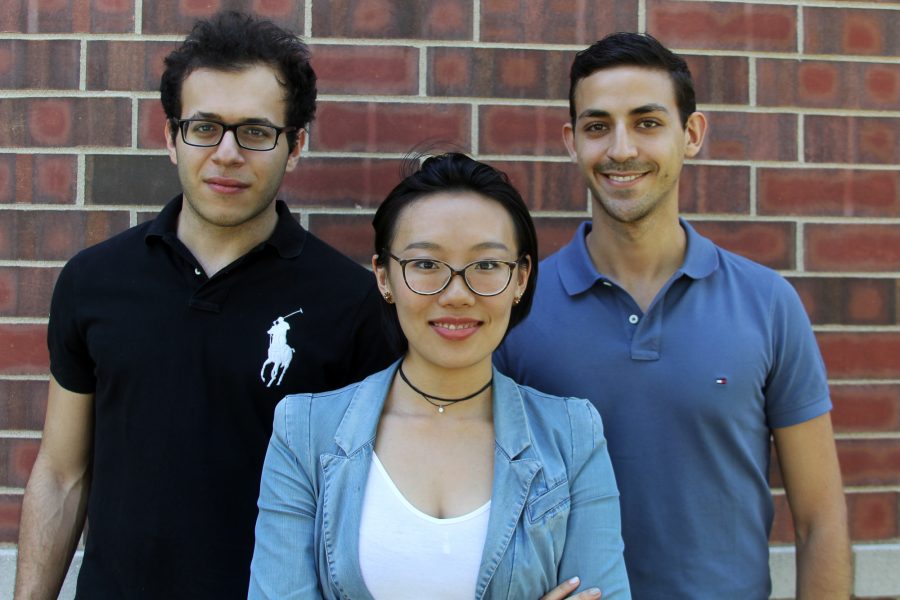Student startup caters to health-conscious peers
Aug 30, 2016
Amidst a growing number of meal delivery services such as Sprig and Blue Apron, one student startup is aiming to cater to a specific kind of customer — the hungry but healthy college student.
Yassine Ibnattya and Hadi Haikal, both seniors in Engineering, describe themselves as students looking to achieve a healthy lifestyle. But taking the time to cook a nutritious meal is not always an option.
About a year ago, the two found a temporary solution. One of their friends was receiving ten meals a week from his uncle, who also happened to be a chef. They were quick, easy meals that could be reheated and ready to go in a few minutes.
Ibnattya and Haikal started receiving meals as well, until their friend’s uncle got so overwhelmed with the growing amount of orders that he had to stop.
“When we saw our friend and his uncle doing all this, we were really inspired,” Haikal said. “We realized that . . . if we figure this out, if we find a good process to do this, then we’ll change our own lives, we’ll change the lives of everyone around us, we’ll inform the students about healthier lifestyles.”
Get The Daily Illini in your inbox!
That’s how they came up with the idea for Fraicher, a delivery service for fresh, pre-made meals that they hope will answer the lack of reliable food options for the healthy college student. While the service hasn’t officially begun, they plan to have a soft launch this fall.
“We thought, there’s a big market for this, there’s a need, and we want to have healthy food,” Ibnattya said. “We want to have that option of not being stuck between classes and not having to spend one hour cooking or going to get groceries . . . we thought there was a better way to do it.”
They began to attend entrepreneurship events on campus. Ibnattya pitched their idea for Fraicher at one event and received a lot of positive feedback from University students.
“They were telling me, ‘Yes, when is this launching, when is this happening, can I order?’” he said.
They were then introduced to iVenture Accelerator, the University’s educational accelerator for student startups. After refining their business plan and making a website, they decided to apply and got in.
Since then, Ibnattya, Haikal and Yurui Tong, the startup’s financial advisor and junior in Business, have worked with their mentors at the Accelerator in preparation for their soft launch. Over a period of 12 weeks, they will test their process by serving to a small number of customers on campus.
They said what makes their service different is how the meals are ordered. Customers can sign up for what is essentially a meal plan, choosing how many meals they want each week and when they want them delivered. The menu will rotate each week, depending on feedback and seasonal change.
Though they are still tweaking what meals they’ll include, Ibnattya and Haikal are working with local chefs like Raquel Ritz to provide homestyle cooking with a local twist.
“I’m about all-natural cooking, bringing fresh ingredients, healthy ingredients with simple concepts . . . but homestyle cooking that everyone wants and is happy with,” Ritz said. “That’s what we’re going to start working with.”
Some examples of meals are shrimp linguine, coconut rice chicken and grilled salmon. The meals will cost around $9 to $12 per plate, including delivery.
During their soft launch, Ibnattya and Haikal will also be delivering the meals themselves to get a feel of their customer base and have close interactions with them — something they believe will set their business apart.
“When you use services like GrubHub or OrderUp, most of the time, there’s someone that delivers that food and just gives it to you and leaves,” Ibnattya said. “You don’t have any kind of close interaction with that person, whereas if it’s a student, you’re more comfortable with that person, you can have a two-minute chat just to get a feel of how they like the food and how they think we could improve.”
They see the college campus as a setting where healthy meal delivery services are lacking, and they hope Fraicher can fill that gap.
“Even in Chicago, there are a lot of people competing with each other to capture the healthy food industry,” Haikal said. “But over here, me and (Ibnattya) are people who like to eat healthy, and there’s no one competing for us.”
Once they streamline their process on the University campus, they hope to move to other campuses across the country.
“We’re just trying to refine our process over here and if we get that golden recipe, we can basically copy paste it to other campuses,” Haikal said. “There is a lack of this everywhere in the nation and we think, not only do we want to make our lives better, we want to make our friends’ lives better.”






